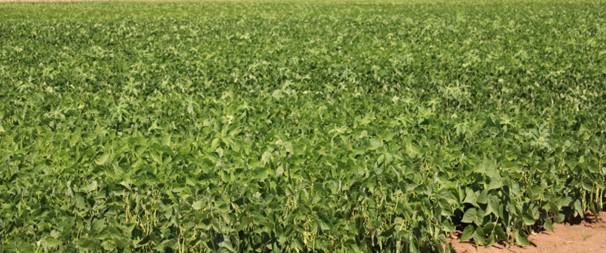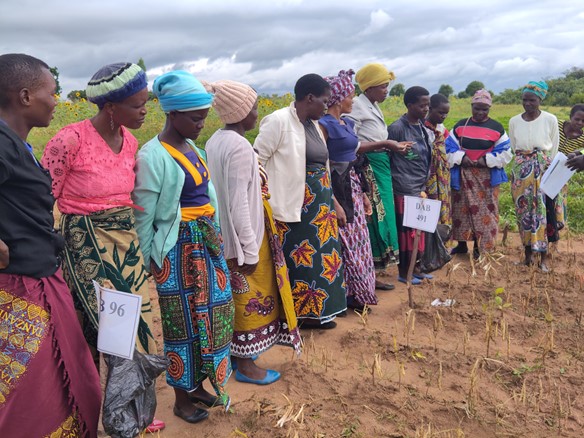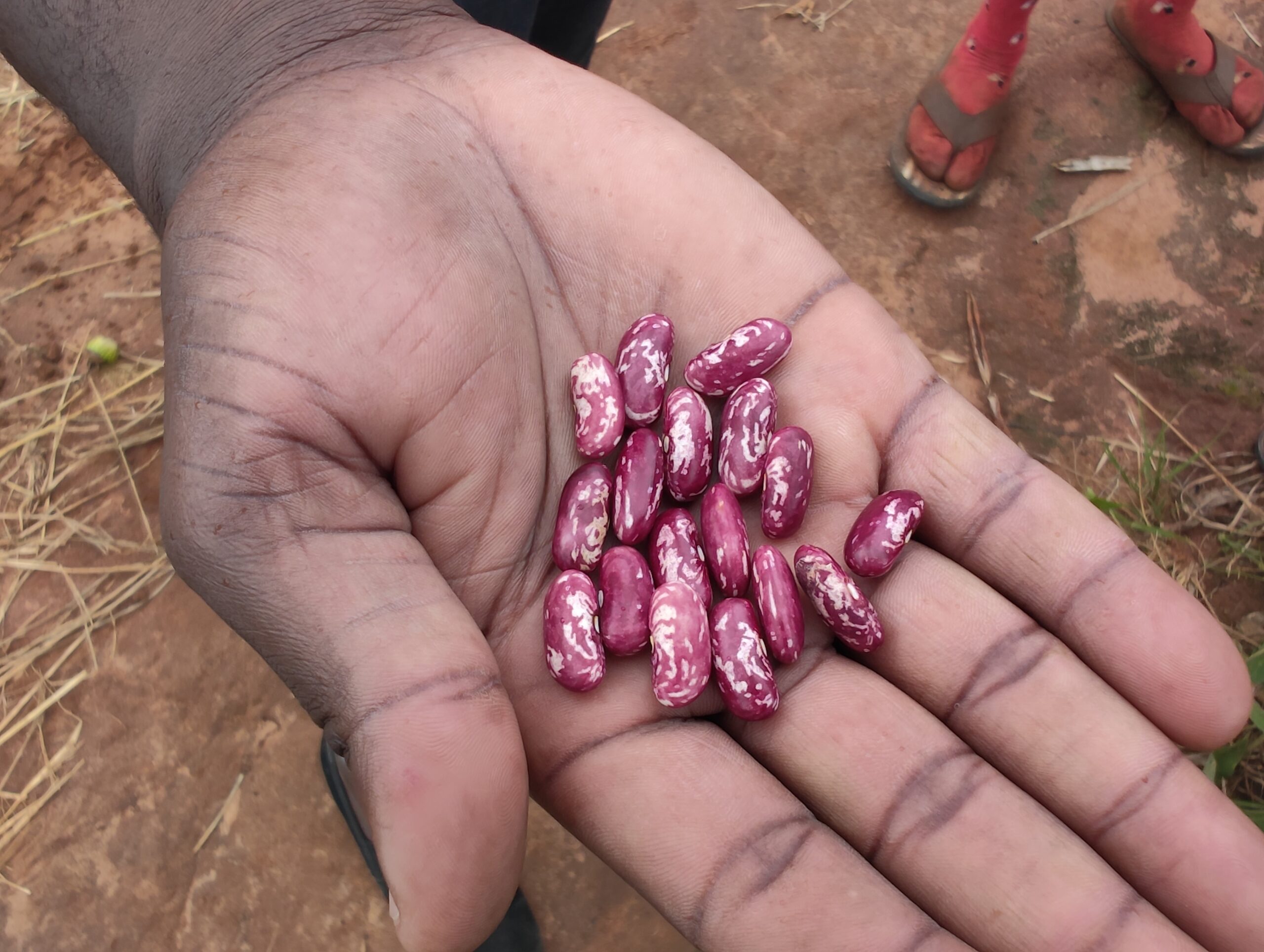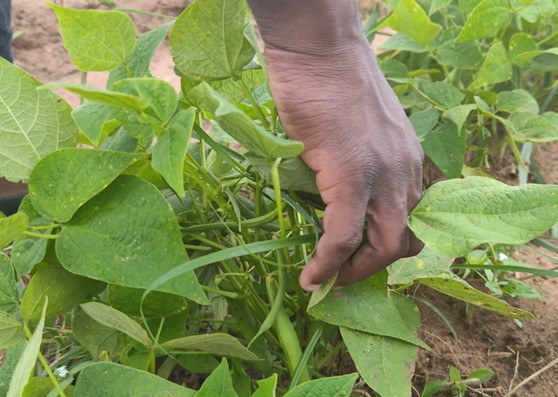By Yohane Chideya, Wilson Nkhata, Eliud Birachi & Jefferson Munyao
Without exactly knowing what they were getting themselves into, Watson Chirwa and his colleague Takula Kathumba took a risk and put together resources to venture into the bean seed multiplication.
For a start, in 2022 the duo cultivated 11 hectares of NUA 45 bean seeds, an early maturity bean variety with high iron and zinc, which has a potential yield of 2.8 tons per hectare. The farmers fell in love with it instantly and they have showed no sign of slowing down.
After tasting the fruits of their maiden labor, at the start of 2023 the duo thought of increasing their efforts by planting 40 hectares of NUA 45 bean variety, at a farm situated at Ekwendeni – north of Mzimba district.
“We are likely to harvest one tonne of NUA 45 beans per hectare, which will fetch up to K1.8 million ($1,700). We cultivated about 40 hectares of land, and we have seen that it is a lucrative business. “No doubt we would like to go on with this variety for a long time,” explains Takula Kathumba, a farmer based in Mzimba north.

Part of the 40 hectares of NUA 45 beans at Ekwendeni grow by seed multipliers Kathumba and Chirwa – Picture by Yohane Chideya
This was after the Alliance of Bioversity International, and the International Centre for Tropical Agriculture (CIAT)eased the bean variety and allowed Seed Companies to produce more of it. Thanks to the $1.525 million funding by United States Agency for International Development (USAID) through Feed the Future and Michigan State University, Multi-stakeholder Platform (MSP) propelled CIAT’s dreams.

Female farmers voting for their preferred bean varieties during participatory variety selection exercise in Mzimba, Malawi. The Multi -stakeholder platforms in Malawi also ensured that they took a gendered approach in the establishment of the Bean Value chain – photo by Yohane Chideya
Seed Co Malawi one of seed producers and an MSP member, provided Kathumba and Chirwa with NUA 45 seed to grow and is expected to buy back from the duo after harvesting.
“This time year we thought of injecting K25 million [approximately $24,300]. We planted the beans on February 25, 2023. By mid-April, the seeds had matured. We anticipate a 100% return to our investments,” adds Chirwa.
Kathumba is equally thrilled with what they have seen so far. He says the bean farming has been great for the time they have been in it, and they would love to continue with the variety in years to come.
“NUA 45 is biofortified and it takes 90 days (about 3 months) or less to mature. We are extremely comfortable with it, because it is easy to manage, even in harsh climates it has shown that it can still survive,” explains Kathumba.
Upon realizing that there was low production of certified bean seed in Malawi, MSP members put mechanisms to enable players in the bean value chain in Malawi by sharing ideas. Seed Co Production Manager, Richard Banda, said with superior quality seed, the entire bean farming can continue to grow over the years and uplift the livelihoods of many Malawians. The seed production company is producing 40 metric tons of NUA45 pre-basic seed which will see the company producing 800 metric tons of certified seed in 2023 alone.
“Common Bean farming can be a notable change to Malawi’s economy. With the availability of quality seed, we are guaranteed good beans on the market. This should be the goal for all the partners in the platform,” says Banda.
Mgomera Seed is another company that been part of the MSP and one of its Senior Manager Blessing Kasolekani testifies that there has been growing demand for NUA 45 beans. He says encouraging the cultivation of certified seed such as NUA 45, haricot canning bean and Sugar131 can change the future of bean farming in Malawi in a blink.
Wanangwa Chafulumira is the Business Development Manager for Paramount Commodities Limited, one of the agricultural companies in Malawi, and he concurs with both Banda and Kasolekani. According to him, with intense market diversification and investment in seed production, the entire bean value chain can grow bigger and make the entire bean value chain improve for the better.
“We need to invest more in seed production. Once we achieve this, even neighboring countries will be able to come into Malawi to buy legumes from us, which is exceptionally good for the development of the nation,” he explains.
Plant Breeder and Southern African Bean Research Network (SARBN) Coordinator, Wilson Nkhata, has since described the strides registered as far as promising for the future of bean value chain in Malawi and the entire southern part of Africa.
“All partners in MSP have played a critical role in making these efforts a success. The platform is here to stay. As a leading partner of the platform in Malawi, we celebrate all the successes registered because of the efforts from various key players,” Nkhata says.

NUA 45 beans after their maturity in Kathumba and Chirwa’s farm at Ekwendeni – Picture by Yohane Chideya.

